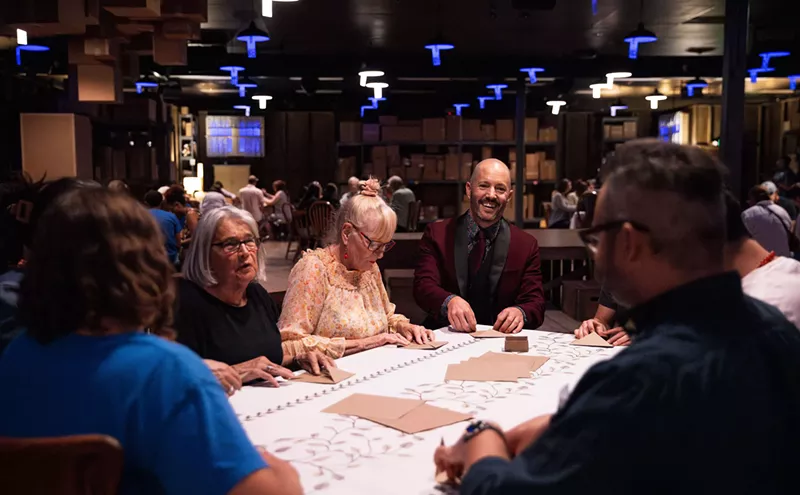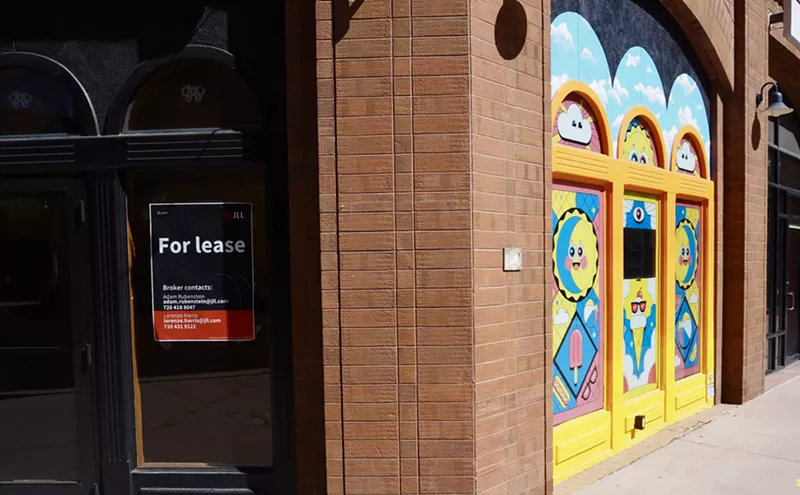The big change for the 46th Denver Film Festival, which gets underway on Friday, November 3, and runs through Sunday, November 12, is that the annual celebration of motion pictures has gotten smaller, going from twelve days to ten. But artistic director Matt Campbell is hopeful that fewer flicks will feel like more — or at least not significantly less than local cineastes have enjoyed for decades.
"We tried to be as thoughtful as possible with our selection process and how many films we're showing, as well as the venues and capacity," Campbell says. "We reassessed everything we're doing with the festival — not doing change for change's sake, but being mindful in our approach."
In the wake of the pandemic, both nonprofits in general and the movie industry as a whole have faced plenty of economic headwinds, many of them traveling at a tornadic pace. But Campbell avoids talking about dollars and cents in relation to the shrinkage of this year's event.
"There were a lot of different factors," he notes. "We've been hearing for years that twelve days is a really long time for a festival, and most regional festivals have gone below that. A lot of them are only five days. And starting on a Wednesday" — as has long been the case for the DFF — "was great, but we did get feedback from the audience that they would prefer to have the opening on a weekend night."
Two new venues have been added to the festival lineup this year: MCA Denver's Holiday Theater, 2644 West 32nd Avenue, plus the Denver Museum of Nature & Science Infinity Theater, which will host the closing-night presentation. And while only the fest's opening will take place at the Ellie Caulkins Opera House, as opposed to the usual multiple showcases, returning settings such as the Sie FilmCenter, Denver Botanic Gardens and the AMC 9 + CO 10, 826 Albion Street, will be hopping over the course of a week-plus.
Still, Campbell acknowledges that "our overall number of screens have decreased," as have the amount of feature-length films (108, down from 143 in 2022) and total offerings (189, as opposed to 231 last year). "But that was intentional. We wanted to make sure that we're putting out the best product that is available to us and messaging our audience in the most straightforward and concise way."
The decrease in slots made the process of determining which movies made the final cut that much trickier. But Campbell sees qualitative benefits to the required streamlining.
"I'm not necessarily picking the films that are most aligned to my personal taste," he points out. "I'm trying to create a balanced program that will satisfy the varying tastes and interests of our audience. And because of when our festival is scheduled, we're able to watch a critical mass of film that is coming out, starting in January with Sundance and through the fall with the festivals in Telluride, Venice and Toronto. On the flip side of that, there are a lot of films I would love to have in the festival that weren't available to us for various reasons. But at the end of the day, the choices became clearer, and the best naturally rose to the top."
The strike involving the Writers Guild of America, which began in early May and wasn't resolved until late September, and the ongoing work stoppage by members of the Screen Actors Guild would seem to have added to the fest's degree of difficulty by preventing stars from coming to Denver, but Campbell says the impact was quite modest. Most of the films shown at the DFF come from independent companies that were allowed to keep operating as normal after agreeing in advance to honor any contract reached with major studios, so folks involved in the making of new films were under no restrictions when it came to appearances at festivals. Moreover, Michael Shannon, the biggest star coming to Denver this time around (his credits include Knives Out, Bullet Train, The Flash and the Showtime miniseries George & Tammy), is being honored for his directorial debut, Eric LaRue, rather than his acting.
Shannon's appearance on Monday, November 6, at the Sie FilmCenter is sold out, as is All of Us Strangers, a highly anticipated effort for which director Andrew Haigh will receive the CinemaQ LaBahn Ikon Film Award on Friday, November 10, at the Denver Botanic Gardens. Likewise, no more tickets are available for the Centerpiece presentation of Hayao Miyazaki's The Boy and the Heron, happening on Wednesday, November 8, at the Botanic Gardens. But Campbell stresses that lots of other high-profile works remain accessible, beginning with day one.
"We're kicking things off on Friday, November 3, with American Fiction, a really fantastic comedy directed by Cord Jefferson," he says. "He comes from a writing background; he's written for TV, including Watchmen, Station Eleven and The Nightly Show With Larry Wilmore. The film stars Jeffrey Wright, and it won the audience award at the Toronto International Film Festival, which has been a historic indicator for success on the awards circuit, and it's a very smart satire — very funny. I definitely laughed out loud multiple times — but it's also a film that makes you think and really has something to say about our current cultural zeitgeist, the literary world and the presentation of African Americans."
A different angle on Black excellence comes courtesy of the festival's other Centerpiece screening, set for Tuesday, November 7, at the Denver Botanic Gardens — Maxine's Baby: The Tyler Perry Story. "I haven't been exposed to a lot of Tyler Perry's work, to be honest," Campbell concedes, "but I found the documentary to be really fascinating. It's quite impressive what he has done with his career, attaining mogul status within the entertainment world that's really unparalleled in contemporary filmmaking and television. It's a fantastic film both for fans and people who don't know much about him, and it definitely piqued my interest to explore more of the Tyler Perry universe."
And then there's I.S.S., "which stands for the International Space Station," Campbell says. "The film is directed by Gabriela Cowperthwaite, who's a native of Denver. We've had several of her films in the festival previously, and we're very excited to elevate her to our closing-night presentation," on Saturday, November 11, at the Infinity Theater. "The premise is that there are three astronauts and three cosmonauts on the space station when, on Earth, their countries go to war — and their governments radio up to the space station telling them to take it over. For it being an independently produced film, it looks like a major blockbuster, and the cast is fantastic: Ariana DeBose, Chris Messina, Costa Ronin. It's going to be a homecoming for Gabriela, and she'll be there."
Also well represented are films that fall within programming sections that have become DFF staples: CinemaQ, CineLatinx, Women+Film and more. In addition, Campbell highlights a large cache of pieces from beyond these shores, with several rooted in Ukraine — among them Iron Butterflies, about the downing of a Malaysia Airlines flight in 2014 that killed all 298 people aboard.
Campbell prefers to focus on the great stuff at the latest festival rather than numerical reductions from previous years. As he sees it, "We're still providing a wealth of international cinema and a broad spectrum of storytelling that will provide a lot of diversity for viewers in the Denver metro area who want to come out for quality cinema."
Find the schedule for the 46th Denver Film Festival here.

Audio By Carbonatix
[
{
"name": "GPT - Billboard - Slot Inline - Content - Labeled - No Desktop",
"component": "23668565",
"insertPoint": "2",
"requiredCountToDisplay": "2"
},{
"name": "STN Player - Float - Mobile Only ",
"component": "23853568",
"insertPoint": "2",
"requiredCountToDisplay": "2"
},{
"name": "Editor Picks",
"component": "17242653",
"insertPoint": "4",
"requiredCountToDisplay": "1"
},{
"name": "Inline Links",
"component": "18838239",
"insertPoint": "8th",
"startingPoint": 8,
"requiredCountToDisplay": "7",
"maxInsertions": 25
},{
"name": "GPT - 2x Rectangles Desktop, Tower on Mobile - Labeled",
"component": "24956856",
"insertPoint": "8th",
"startingPoint": 8,
"requiredCountToDisplay": "7",
"maxInsertions": 25
},{
"name": "Inline Links",
"component": "18838239",
"insertPoint": "8th",
"startingPoint": 12,
"requiredCountToDisplay": "11",
"maxInsertions": 25
},{
"name": "GPT - Leaderboard to Tower - Slot Auto-select - Labeled",
"component": "17676724",
"insertPoint": "8th",
"startingPoint": 12,
"requiredCountToDisplay": "11",
"maxInsertions": 25
}
]












